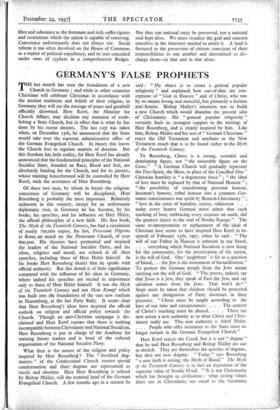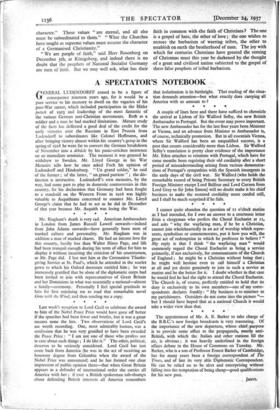GERMANY'S FALSE PROPHETS
THE last month has seen. the foundation of a new -1.I- Church in Germany ; and while in other countries Christians will celebrate Christmas in accordance with the ancient traditions and beliefs of their religion, in Germany they will see the message of peace and goodwill officially, disowned. Herr Kern,l the Minister for Church Affairs, may disclaim any intention of estab- lishing a State Church, but in effect that is what he has done by his recent decrees, The last step was taken when, on December 15th, he announced that the State would take over the supreme administrative office of the German Evangelical Church. In theory this leaves the Church free to regulate matters of doctrine. But this freedom has little reality, for Herr Kerrl has already announced that the fundamental principles of the National Socialist State, founded on Race, Blood and Soil, are absolutely binding for the Church, and for its pastors, whose training henceforward will be controlled by Herr Kerrl, With the assistance of Herr Rosenberg.
Of these two men, by whom in future the religious conscience of Germany will be disciplined, Herr Rosenberg is probably the most important. Relatively unknown in this country, except for an unfortunate diplomatic visit, in Germany he has become, by his books, his speeches, and his influence on Herr Hitler, the official philosopher of a new faith. His first book, The Myth of the Twentieth Century, has had a circulation of nearly 700,000 copies, his last, Protestant Pilgrims to Rome, an attack on the Protestant Church, of over 6o0,000. His theories have permeated and inspired the leaders of the National Socialist Party, and his ideas, religious and moral, are echoed in all their . speeches, including those of Herr Hider himself. In his bOoks Herr Rosenberg denies that he speaks with official authority. But this denial is of little significance compared with the influence of his ideas in Germany, where indeed his speeches are second in importance only to those of Herr Hitler himself. It was the Myth of the Twentieth Century and not Mein Kampf which was built into the foundations of the vast new stadium in Nuremberg, at the last Party Rally. It seems clear that Herr Rosenberg's ideas have inspired the official outlook on religion and official policy towards the Church. Though an anti-Christian campaign is dis- claimed and Herr Kerrl repeats that there is nothing incompatible between Christianity and National Socialism, Herr Rosenberg is put in charge of the Academy for training future leaders and is head of the cultural organisation of the National Socialist Party.
What then is the nature of the religion and policy inspired by Herr Rosenberg ? The " fossilised dog- matifts " of the Confessional Church receive special condemnation and their- dogmas are represented as sterile and obsolete.- Here Herr Rosenberg is echoed by Bishop Muller, still the nominal head' of the German Evangelical Church. A few months ago in a sermon he said : " My object is to create a general popular religiosity " and explained how out-of-date are con- ceptions of " God in Heaven " and of Christ, who was by no means loving and merciful, but primarily a furious anti-Semite. Bishop Miiller's intention was to build a new Church which would abandon the present idea of Christianity. His " general popular religiosity " certainly finds its strongest support in the writings of Herr Rosenberg, and is clearly inspired by him. Like him, Bishop Muller and his sect of " German Christians ' reject the Old Testament and attribute to the New Testament much that is to be found rather in the Myth of the Twentieth Century.
To Rosenberg, Christ is a strong, scornful and dominating figure, not " the miserable figure on the Cross." " A German Church will gradually represent the Fire-Spirit, the Hero, in place of the Crucified One." Christian humility is " a degenerate force " ; " the ideal of love must be replaced by that of National Honour " ; " the possibility of transforming personal honour, kinsman's honour, tribal honour into a common Ger- manic consciousness was spoilt br Romish Christianity " ; " love in the sense of humility, mercy, subjection . . today every honest German must admit that such teaching of love, embracing every creature on earth, did the greatest injury to the soul of Nordic Europe." The same re-interpretation or replacement of the ideal of Christian love seems to have inspired Herr Kerrl in his speech of February 13th, -1937, when he said : " The will of our Father in Heaven is inherent in our blood, . . . everything which National Socialism is now doing for the community, for the preservation of the nation, is the will of God. Our ' neighbour ' is for us a question of blood, . . . the Jew is the instrument of bastardisation." To protect the German people from the Jews meant carrying out the will of God. " The priests, indeed, say that Jesus is a Jew, they speak of Paul the Jew, and say salvation comes from the Jews. That won't do ! " Steps must be taken that children should be protected against any denigration of Party doctrines in their presence. " Christ must be taught according to the laws of our time and circumstances. . . . The content of Christ's teaching must be altered. . . . There has now arisen a new authority as to what Christ and Chris- tianity really are. This new authority is Adolf Hider. . . . People who offer resistance to the State must no longer remain in the German Evangelical Church."
Herr Kerrl rejects the Creed, but it is not " dogma " that he and Herr Rosenberg and Bishop Muller are out to abolish. They are themselves the apostles of dogmas, but they are new dogmas. " Today " says Rosenberg " a new faith is arising, the Myth of Blood." The Myth of the Twentieth Century is in fact an exposition of the supreme value of Nordic blood. " It is not Christianity which has brought us civilisation ; what lasting values there are in Christianity are owed to the Germanic character." These values " are eternal, and all else must be subordinated to them." " What the Churches have taught as supreme values must assume the character of a Germanised Christianity."
" We are people of faith," said Herr Rosenberg on December 5th, at Konigsberg, and indeed there is no doubt that the prophets of National Socialist Germany are men of faith. But we may well ask, what has their faith in common with .the faith of Christians ? The one is a gospel of hate, the other of love ; the one wishes to restore the barbarism of warring tribes, the other to establish on earth the brotherhood of man. The joy with which for centuries Christians have greeted the coming of Christmas must this year be darkened by the thought . of a great and civilised nation subjected to the gospel of these false prophets of tribal barbarism.



































 Previous page
Previous page